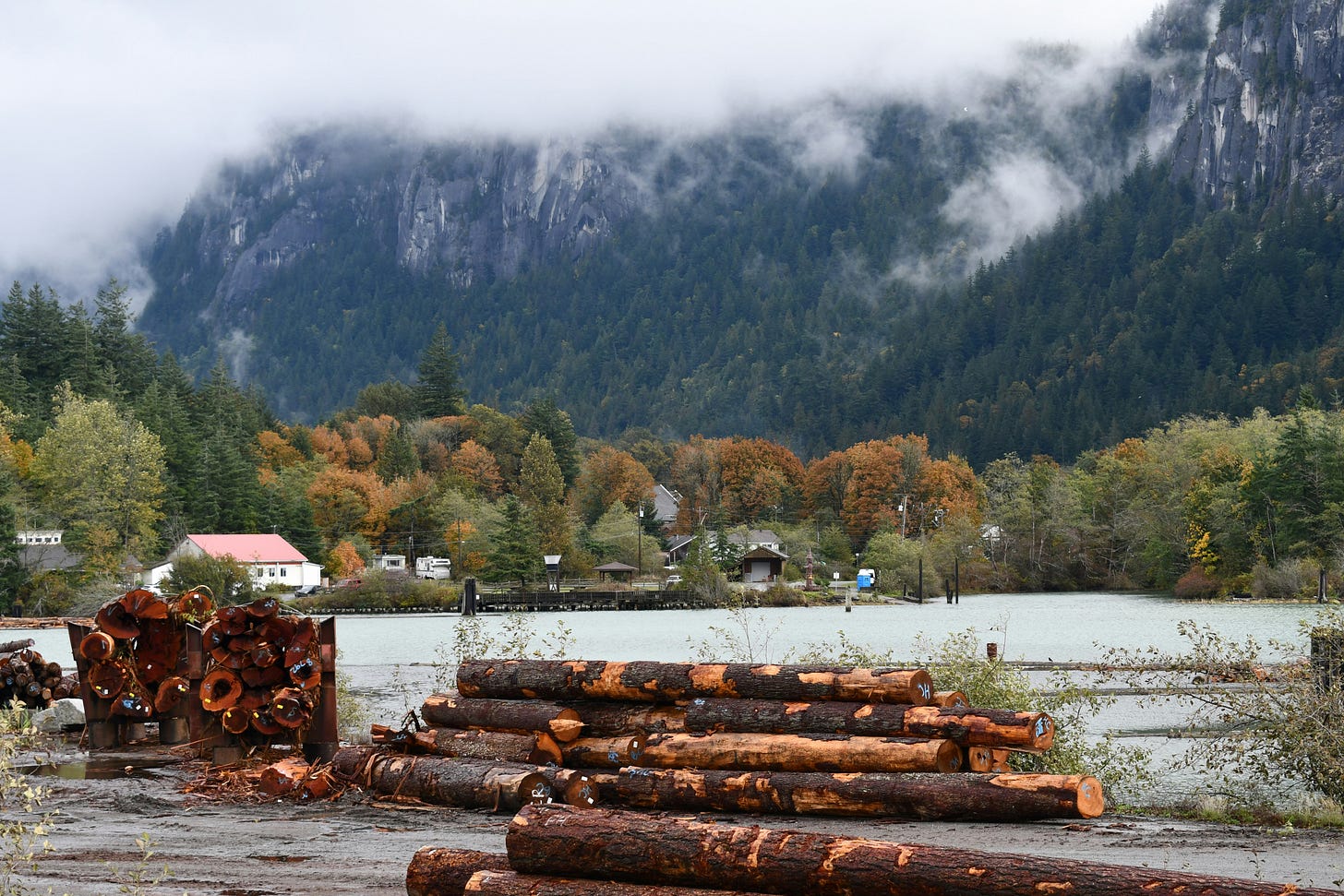The Eco-Update #21
Dispatches from the planet.
What’s in this issue
Capitalism turns B.C. trees into U.K. wood pellets
Forest fragmentation reduces southern Appalachian bat abundance
Eco-Stories In The News
Eco-fiction Review: Reef Mind, by Tenebrous Press
Something You Can Do: Support the Starbucks workers strike
Capitalism turns B.C. trees into U.K. wood pellets

In the forests of British Columbia, beetle outbreaks and fires are killing more trees each year as climate change amplifies environmental problems. While at first glance this would seem like a problem for the timber industry, capitalist enterprise has found a way to monetize tree mortality. Their solution is salvage wood.
Salvage wood is a forestry term typically referring to wood products derived as a by-product of other harvest processes. In a recent study published in Antipode, Dr. Sinead Earley examines the links between tree mortality in B.C., salvage wood, and bioenergy production in the U.K. and Europe.
Dr. Earley chronicles how the death of trees in the Cariboo–Omineca region has led to increases in the bioenergy sector across a global network of consumption. As tree mortality increased in the forests of B.C. during the 2010s, resource managers and policymakers lifted harvesting restrictions in an effort to realize the profit of existing timber stocks before the wood deteriorated. However much of the salvage wood volume was too small or damaged to be of use for lumber and was instead used to create wood pellets for energy production.
Burning biomass for energy has gained momentum recently as a climate change solution; the idea being that the carbon emissions produced from burning are offset by the growth of new biomass (in this case, trees) after harvesting. But increasing the rate of harvesting reduces the amount of carbon stored in forests, particularly in underground pools when trees that would typically remain onsite as deadwood are used for wood pellets.
In the case of forests in B.C., these wood pellets are primarily used for energy production in the U.K., and parts of Europe and Japan. This link, as Dr. Earley idenifies it, puts increased pressure on the forests of British Columbia. As bioenergy usage grows globally, so too does the demand for the wood pellets that fuel it. The now-loosened harvesting restrictions in B.C. allow for capitalist timber industry to meet this growing demand by increasing the rate and intensity of their harvests. The dynamic creates a spatial disconnect in resource use. Governments in the UK and elsewhere that burn wood pellets as a source of bioenergy can claim carbon neutrality despite the harvesting practices in B.C. that are depleting the carbon stores of the forests.
The result is an increase in carbon emissions to the atmosphere. Wood lifecycle estimates suggest that it takes roughly 40-100 years for forest regrowth to offset this carbon, and that’s assuming the regrowth actually reaches previous levels. Fires, droughts, and pest outbreaks are already decreasing the carbon storage potential of forests worldwide, and inserting salvage wood into the global circulation of capitalist energy production only incentivizes more harvesting, thus exacerbating the feedback loop.
Dr. Earley’s work shows the limitations of nature-based solutions that rely on the logics of capitalism to solve climate change. Profit incentive, combined with the need for nonstop growth, can only ever lead to greater resource extraction and environmental exploitation.
Forest fragmentation reduces southern Appalachian bat abundance

A new study by ecologists from Lee University in Tennessee finds that forest fragmentation has negative impacts on vesper bat populations in the southern Appalachians.
Vesper bats (or Vespertilionidae) are a diverse group of bats that have evolved to fill a wide range of ecological niches. According to the study authors, vesper bats are ideal for studying the impacts of habitat fragmentation because of their high mobility while foraging, alongside the importance of bats in general to forest ecosystems.
In their study, the researchers compared vesper bat abundance and diversity in intact forest habitat in the Cherokee National Forest to the surrounding fragmented farmlands. They found a 43% decline in bat abundance in the farmlands relative to intact forests. They also identified reduced biodiversity levels in the fragmented farmlands compared to the forest habitat.
While the paper has not yet been peer-reviewed, the authors state that the results suggest negative impacts of habitat fragmentation on vesper bats, despite the group’s high degree of mobility. They go on to hypothesize that this could be the result of habitat loss in general more so than the fragmentation effects themselves. Forest fragmentation has been found to have diverse ecological impacts on different taxonomic groups. Some species thrive in a patchy, fragmented landscape, while others require large areas of core, interior forest.
However, the authors of the paper note that even though some species do well in fragmented habitats, there is a threshold of habitat loss that will eventually have negative impacts for all species. They argue that this dynamic may play a role in vesper bat population numbers. Furthermore, their research highlights the need more research into the impacts of an increasingly fragmented ecological landscape.
Thanks for being one of the thousands of Brief Ecology readers. The issue you’re reading is free for everyone thanks to our generous supporters. If you want to keep a spotlight on the ongoing environmental destruction of our planet, support our work by becoming a paid subscriber.
Eco-Stories In the News
Mongabay: How a ‘green gold rush’ in the Amazon led to dubious carbon deals on Indigenous lands
The Guardian: Fossil fuel lobbyists outnumber all Cop30 delegations except Brazil, report says
Reuters: Indigenous protesters block entrance to COP30 climate summit in Brazil
Eco-Fiction Review; Reef Mind by Hazel Zorn, published by Tenebrous Press

“A womb is often a grave. One that many people have to carry around. Isn’t that fucked up?”. This line, from Hazel Zorn’s Reef Mind, is indeed fucked up. In fact, a lot of things in the book are fucked up. I think that’s why you should read it.
Reef Mind is a deceptively ambitious book that follows a young couple during an increasingly bizarre eco-apocalypse (of sorts). No, wait, that’s not right. It’s a book about what it means to be human. But that’s not quite right either. It’s a story that uses eco-horror to explore the anxiety of not having children and the dread that comes with knowing children will replace us. Actually no it’s not, it’s about climate and eco-anxiety. It’s about the limits of the familial bond. It’s about children as unknowable others. It’s about sea creatures swimming through the air and people turning into crabs and hiveminds and....let me start over.
Reef Mind is about a lot of things. Zorn explores all the things I just mentioned, and more. And she does it in only 75 pages. I can’t say the book sticks every landing, and it has some pacing issues, but honestly those faults only add to the delirium of Reef Mind. It’s a book I’m going to be thinking about for a long time. It may not be for everyone, but fans of eco-horror and the eco-weird will find much to like here.
Something You Can Do: Support Starbucks workers on strike
The labor fight and the environmental fight are one in the same. Stand in solidarity with Starbucks workers by signing the No Coffee, No Contract pledge, and donate to their strike fund!





In the early 2000s I lived in the southern Caribous. I was a canoe guide and on the way to the lake we'd go up a mountain with a viewpoint. The effect of the pine beetle was evident and I know it extended far beyond that in both time and space. I didn't know about the impact on global energy markets, so thank you for the (disheartening) update. Beyond the vital connections you made to capitalism, it strikes me that the "harvest" also causes a loss of nutrients that would otherwise decompose and nourish the forest. Without that nourishment, the 40-100 years of regrowth would be extended, and reliant on fertilizer. It also strikes me that the regrowth, if planted as a monocrop, would not support the biodiversity needed to prevent further "pest" population explosions. I know you know all that, but wanted to voice it here for the sake of conversation on these vital issues.
Regarding the bats, of which I know little, I wonder if tended hedgerows and wooded corridors adjacent to farm land would help. Perhaps they require much larger tracts of wild forest, but I wonder if a series of naturalized areas would make an impact.